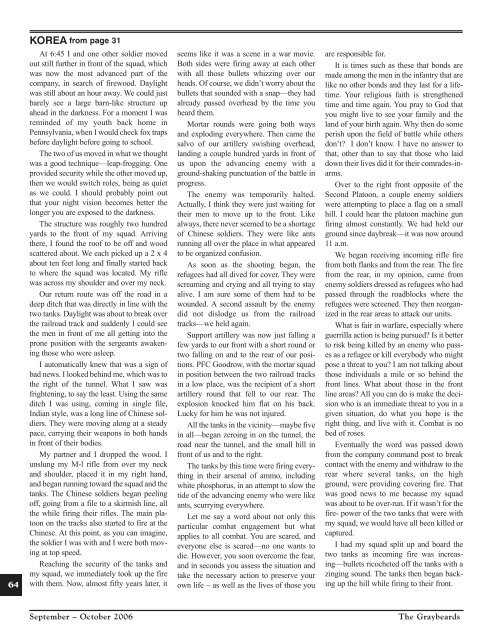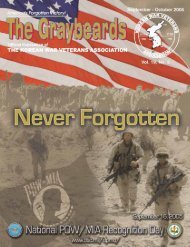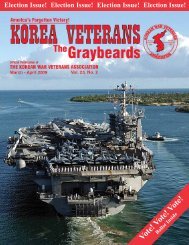The Graybeards - KWVA - Korean War Veterans Association
The Graybeards - KWVA - Korean War Veterans Association
The Graybeards - KWVA - Korean War Veterans Association
You also want an ePaper? Increase the reach of your titles
YUMPU automatically turns print PDFs into web optimized ePapers that Google loves.
KOREA from page 31<br />
64<br />
At 6:45 I and one other soldier moved<br />
out still further in front of the squad, which<br />
was now the most advanced part of the<br />
company, in search of firewood. Daylight<br />
was still about an hour away. We could just<br />
barely see a large barn-like structure up<br />
ahead in the darkness. For a moment I was<br />
reminded of my youth back home in<br />
Pennsylvania, when I would check fox traps<br />
before daylight before going to school.<br />
<strong>The</strong> two of us moved in what we thought<br />
was a good technique—leap-frogging. One<br />
provided security while the other moved up,<br />
then we would switch roles, being as quiet<br />
as we could. I should probably point out<br />
that your night vision becomes better the<br />
longer you are exposed to the darkness.<br />
<strong>The</strong> structure was roughly two hundred<br />
yards to the front of my squad. Arriving<br />
there, I found the roof to be off and wood<br />
scattered about. We each picked up a 2 x 4<br />
about ten feet long and finally started back<br />
to where the squad was located. My rifle<br />
was across my shoulder and over my neck.<br />
Our return route was off the road in a<br />
deep ditch that was directly in line with the<br />
two tanks. Daylight was about to break over<br />
the railroad track and suddenly I could see<br />
the men in front of me all getting into the<br />
prone position with the sergeants awakening<br />
those who were asleep.<br />
I automatically knew that was a sign of<br />
bad news. I looked behind me, which was to<br />
the right of the tunnel. What I saw was<br />
frightening, to say the least. Using the same<br />
ditch I was using, coming in single file,<br />
Indian style, was a long line of Chinese soldiers.<br />
<strong>The</strong>y were moving along at a steady<br />
pace, carrying their weapons in both hands<br />
in front of their bodies.<br />
My partner and I dropped the wood. I<br />
unslung my M-l rifle from over my neck<br />
and shoulder, placed it in my right hand,<br />
and began running toward the squad and the<br />
tanks. <strong>The</strong> Chinese soldiers began peeling<br />
off, going from a file to a skirmish line, all<br />
the while firing their rifles. <strong>The</strong> main platoon<br />
on the tracks also started to fire at the<br />
Chinese. At this point, as you can imagine,<br />
the soldier I was with and I were both moving<br />
at top speed.<br />
Reaching the security of the tanks and<br />
my squad, we immediately took up the fire<br />
with them. Now, almost fifty years later, it<br />
seems like it was a scene in a war movie.<br />
Both sides were firing away at each other<br />
with all those bullets whizzing over our<br />
heads. Of course, we didn’t worry about the<br />
bullets that sounded with a snap—they had<br />
already passed overhead by the time you<br />
heard them.<br />
Mortar rounds were going both ways<br />
and exploding everywhere. <strong>The</strong>n came the<br />
salvo of our artillery swishing overhead,<br />
landing a couple hundred yards in front of<br />
us upon the advancing enemy with a<br />
ground-shaking punctuation of the battle in<br />
progress.<br />
<strong>The</strong> enemy was temporarily halted.<br />
Actually, I think they were just waiting for<br />
their men to move up to the front. Like<br />
always, there never seemed to be a shortage<br />
of Chinese soldiers. <strong>The</strong>y were like ants<br />
running all over the place in what appeared<br />
to be organized confusion.<br />
As soon as the shooting began, the<br />
refugees had all dived for cover. <strong>The</strong>y were<br />
screaming and crying and all trying to stay<br />
alive. I am sure some of them had to be<br />
wounded. A second assault by the enemy<br />
did not dislodge us from the railroad<br />
tracks—we held again.<br />
Support artillery was now just falling a<br />
few yards to our front with a short round or<br />
two falling on and to the rear of our positions.<br />
PFC Goodrow, with the mortar squad<br />
in position between the two railroad tracks<br />
in a low place, was the recipient of a short<br />
artillery round that fell to our rear. <strong>The</strong><br />
explosion knocked him flat on his back.<br />
Lucky for him he was not injured.<br />
All the tanks in the vicinity—maybe five<br />
in all—began zeroing in on the tunnel, the<br />
road near the tunnel, and the small hill in<br />
front of us and to the right.<br />
<strong>The</strong> tanks by this time were firing everything<br />
in their arsenal of ammo, including<br />
white phosphorus, in an attempt to slow the<br />
tide of the advancing enemy who were like<br />
ants, scurrying everywhere.<br />
Let me say a word about not only this<br />
particular combat engagement but what<br />
applies to all combat. You are scared, and<br />
everyone else is scared—no one wants to<br />
die. However, you soon overcome the fear,<br />
and in seconds you assess the situation and<br />
take the necessary action to preserve your<br />
own life ~ as well as the lives of those you<br />
are responsible for.<br />
It is times such as these that bonds are<br />
made among the men in the infantry that are<br />
like no other bonds and they last for a lifetime.<br />
Your religious faith is strengthened<br />
time and time again. You pray to God that<br />
you might live to see your family and the<br />
land of your birth again. Why then do some<br />
perish upon the field of battle while others<br />
don’t? I don’t know. I have no answer to<br />
that, other than to say that those who laid<br />
down their lives did it for their comrades-inarms.<br />
Over to the right front opposite of the<br />
Second Platoon, a couple enemy soldiers<br />
were attempting to place a flag on a small<br />
hill. I could hear the platoon machine gun<br />
firing almost constantly. We had held our<br />
ground since daybreak—it was now around<br />
11 a.m.<br />
We began receiving incoming rifle fire<br />
from both flanks and from the rear. <strong>The</strong> fire<br />
from the rear, in my opinion, came from<br />
enemy soldiers dressed as refugees who had<br />
passed through the roadblocks where the<br />
refugees were screened. <strong>The</strong>y then reorganized<br />
in the rear areas to attack our units.<br />
What is fair in warfare, especially where<br />
guerrilla action is being pursued? Is it better<br />
to risk being killed by an enemy who passes<br />
as a refugee or kill everybody who might<br />
pose a threat to you? I am not talking about<br />
those individuals a mile or so behind the<br />
front lines. What about those in the front<br />
line areas? All you can do is make the decision<br />
who is an immediate threat to you in a<br />
given situation, do what you hope is the<br />
right thing, and live with it. Combat is no<br />
bed of roses.<br />
Eventually the word was passed down<br />
from the company command post to break<br />
contact with the enemy and withdraw to the<br />
rear where several tanks, on the high<br />
ground, were providing covering fire. That<br />
was good news to me because my squad<br />
was about to be over-run. If it wasn’t for the<br />
fire- power of the two tanks that were with<br />
my squad, we would have all been killed or<br />
captured.<br />
I had my squad split up and board the<br />
two tanks as incoming fire was increasing—bullets<br />
ricocheted off the tanks with a<br />
zinging sound. <strong>The</strong> tanks then began backing<br />
up the hill while firing to their front.<br />
September – October 2006<br />
<strong>The</strong> <strong>Graybeards</strong>

















